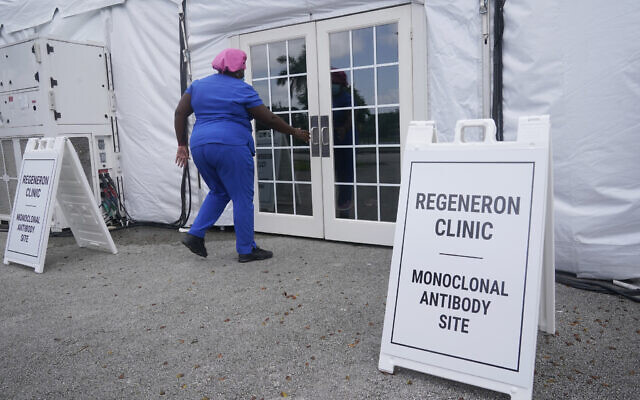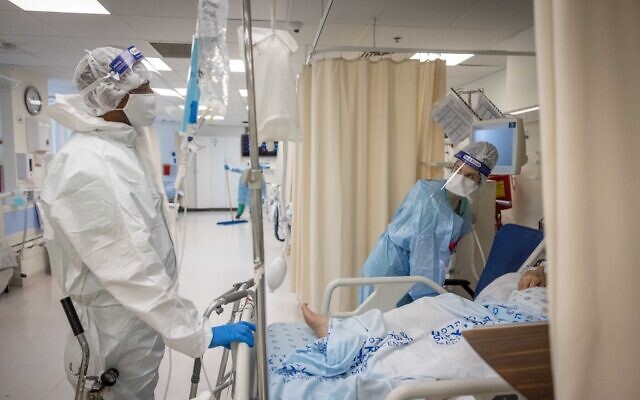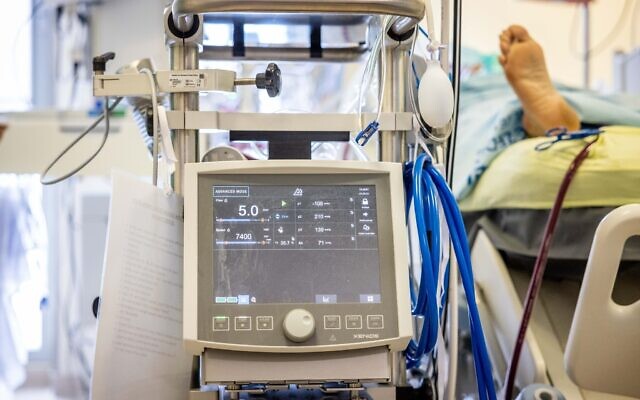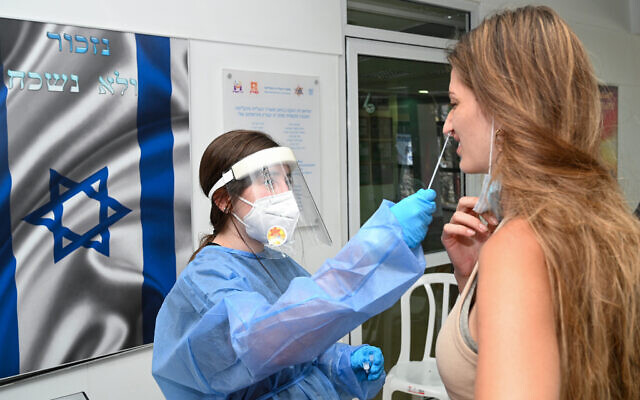Uninfected people who contract the coronavirus are also refusing to accept antibody treatments that could prevent them from becoming seriously ill or dying, a health provider said on Saturday.
Last Thursday, Israel began widely administering Regeneron’s under-the-skin injectable synthetic antibody treatment to COVID-19 patients at risk of developing a serious illness, prioritizing those who are at risk of developing a serious illness. are more likely to occur.
As reported by Channel 12 News, the Meuhdet Health Fund offered treatment to seven illiterate patients who were at risk of becoming seriously ill.
Only one of them agreed to accept the treatment, while six refused.
The health fund said that, in comparison, the drug was offered to two vaccinated people, who both agreed to start the regimen immediately.
Health professionals believe this may be a pattern they begin to see as drug use becomes more widespread, the report said.

A nurse enters a monoclonal antibody site at CB Smith Park in Pembroke Pines, Florida, on August 18, 2021. (AP Photo/Marta Lavandier)
“As soon as we got the green light to use Regeneron, the control center is working to find suitable candidates for the treatment. We reach out to them to explain and try to convince them to get it. But I share in the frustration of my staff,” said Dr Erez Carmon, chief of medical services at the Coronavirus Command Center in Mehedate.
“Despite the explanation, unvaccinated patients will not accept Regeneron treatment. They say they are under tremendous pressure from the community and their families to refrain from it. Fortunately, most vaccinated people express a desire to self-medicate and protect themselves. There is a very small window of opportunity to defend oneself, it is a shame to miss it,” he said.
The treatment, which was credited in the recovery of former United States President Donald Trump, uses a combination of the two antibodies as a treatment for people already sick with the virus and as a preventive measure to vaccinate still healthy people. does to help.
Antibody drugs are one of the only treatments proven to reduce the risk of death from COVID-19, especially for people who are not yet in hospital. It is authorized for preventive use by the US Food and Drug Administration.
Meanwhile, Idit Matot, director of anesthesia at Tel Aviv’s Ichilov Hospital, told Channel 12 on Saturday that the decision not to get vaccinated was in some ways suicidal, and affected the lives of other patients who were unable to receive the vaccine. the care they need.
Matot said hospitals were full of illiterate youth – most of whom eventually survive their battle with COVID-19, but are hospitalized requiring prolonged intensive care.

Members of a hospital team wearing protective gear work in the coronavirus ward of the Shaare Zedek Hospital in Jerusalem on September 23, 2021. (Yontan Sindel/Flash 90)
Matot said that after his initial hospitalization with COVID-19, the pressure on hospitals meant he was being transferred to general intensive care units for the remainder of his treatment, initially for other therapies. Beds have been earmarked for people with issues.
“It is possible to prevent this situation, it not only affects people who have decided to die by suicide to one degree or another – it affects all of us here,” she said.
Matot said the medical teams were exhausted, and criticized the government for refusing to implement the new rules.
“They have to be more decisive as a government, have a traffic light system [for different localities]. They should use it—don’t start [blanket] Sanctions. I should not pay the price for the illiterate population. It should be clear – either you get vaccinated or you get tested every three days,” Matot said.

The ECMO machine in the intensive care unit at Share Zedek Hospital in Jerusalem on September 23, 2021. (Yontan Sindel / Flash 90)
Prime Minister Naftali Bennett reportedly pushed back against imposing new coronavirus restrictions on Saturday, even as the number of COVID patients requiring ventilators climbed to levels not seen in Israel in months .
According to the health ministry on Saturday evening, 221 people infected with the coronavirus were on ventilators, an increase of 18 from 203 on Friday morning, when Israel crossed the 200 mark for the first time since March.
Health ministry data also said that there were 694 patients in critical condition, up from 700 on Friday. Of these, the condition of 295 is stated to be critical.
While Israel’s fourth wave of infections has seen record numbers of daily cases, the number of patients hospitalized has been lower than in previous waves, which experts attribute to the country’s high vaccination rates.
The death toll since the start of the pandemic rose to 7,649 on Saturday night. A total of 567 people have succumbed to the virus since the start of the month, making September the second consecutive month that Israel has recorded at least 500 deaths, after August 609 deaths attributed to COVID-19 Gaya.
The ministry’s data also showed 4,937 new infections over the weekend, continuing a slow downward trend, with the number of active cases falling slightly from 62,993.

A Magan David Adom volunteer takes a swab sample from an Israeli woman at a coronavirus testing site in the Golan Heights city of Katzrin on September 15, 2021. (Michael Gilady/Flash 90)
Amid mixed numbers, government and health officials appeared to be feuding over imposing additional coronavirus restrictions, with Bennett reportedly deciding against further limits on gatherings.
In a meeting on Saturday night with Health Minister Nitzan Horowitz, Coronavirus Tsar Salman Zarka, Director General of the Ministry of Health Nachman Aish and directors of Israel’s health providers, Bennett reportedly said the proposed restrictions on gatherings would hurt the economy and not reduce morbidity. will do.
“The policy of the government is an open Israel with an unrelenting and sophisticated war against the virus. Not quarantine, lockdown, greater restrictions, which is the easiest thing to do, but the solution,” Bennett said, according to the Ynet news site.
“I think about the patients, everyone in the coronavirus ward is heartbroken, but I also think about the economy, education, parents who have to work and kids who have to read,” he reportedly said. But said.
Bennett is said to have told the heads of Israel’s HMOs that their focus should continue to emphasize vaccination.